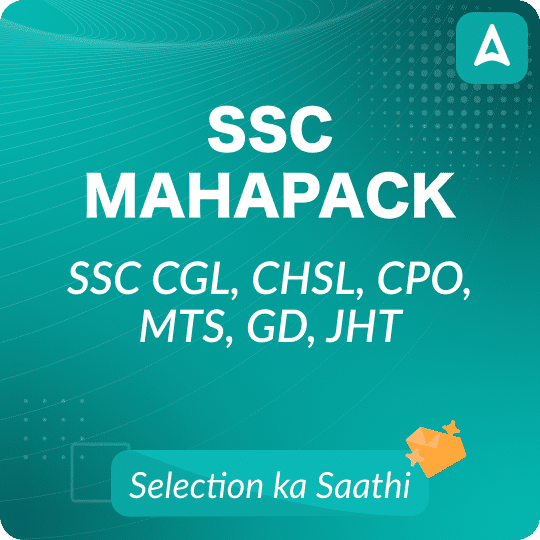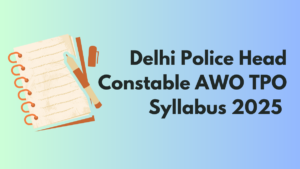The Union Public Service Commission releases the UPSC EPFO APFC Notification 2024 for the recruitment of Enforcement Officers (EO)/ Accounts Officers (AO) and Assistant Provident Fund Commissioners (APFC) annually for candidates across the country. Graduate candidates from any field of specialization can apply for the position of EPFO. To prepare for the examination candidates must be aware of the detailed knowledge of the syllabus as well as the exam pattern. Go through the article and understand the syllabus thoroughly.
UPSC EPFO Syllabus 2024
Interested candidates must be looking for the UPSC EPFO APFC Syllabus as well as the exam pattern to start their preparation journey for the upcoming examination. The candidates have to begin their preparation as the Exam Date is released by the commission along with the annual calendar. The UPSC EPFO Exam 2024 is scheduled for 07 July 2024.
UPSC EPFO APFC Selection Process 2024
The candidates applying for UPSC EPFO APFC 2024 will be selected through a two-stage selection process.
UPSC EPFO Stage1: Recruitment Test [Pen & Paper Based]
- In this test, there will be a total number of 120 questions with a time duration of 120 minutes. The whole exam will have a weightage of 100 marks.
- 1/3 mark will be deducted for each wrong answer.
UPSC EPFO Stage 2: Interview
Candidates who will qualify for the UPSC EPFO APFC 2024 written examination will be called for an interview. The interview will be for 100 marks. Candidates are required to score minimum marks which are given below as per different categories.
| Name Of The Category | Minimum Marks |
| UR | 50 |
| OBC | 45 |
| SC/ST/PH | 40 |
The weightage of the UPSC EPFO APFC written examination and the interview will be 3:1. The marks scored in the online examination will be calculated out of 300 and the final merit will be prepared out of 400 marks.
UPSC EPFO Exam Pattern 2024
UPSC conducts the EPFO APFC exam in two stages, The first stage of the examination is the recruitment test i.e. based on pen and paper, carrying Objective type questions. The second stage is an interview carrying 25% weightage. The final selection of a candidate will be based on the marks obtained in the Recruitment Test and Interview.
| Name of Exam | Marks | Weightage |
|---|---|---|
| Recruitment Test | 300 | 75% |
| Interview | 100 | 25% |
Exam Scheme of Stage 1: Recruitment Test
- The test will be two hours duration. All questions will carry equal marks.
- The test will be objective-type questions with multiple choices of answers.
- The medium of the test will be both Hindi and English.
- There will be a penalty for wrong answers. Every wrong answer will carry a deduction of one-third of the marks assigned to that question. If no answer is marked for a question, there will be no penalty for that question.
- The interview stage in this exam involves minimum qualifying marks.
| Category | Qualifying marks |
|---|---|
| General | 50 |
| OBC | 45 |
| SC/ST/PH | 40 |
UPSC EFPO APFC Syllabus 2024
Candidates must start their preparation by understanding the topics covered in the examination. These topics will help you to strategize your preparation accordingly and identify your weaker as well as stronger areas. The UPSC EPFO Syllabus includes the following topics:
| UPSC EO/AO Syllabus 2024 | |
| General English- To evaluate the candidate’s understanding of the English language & workman-like use of words. | Indian Freedom Struggle. |
| Current Events and Developmental Issues | Indian Polity & Economy |
| General Accounting Principles | Industrial Relations & Labour Laws |
| General Science & knowledge of Computer applications | General Mental Ability & Quantitative Aptitude |
| Social Security in India | |
UPSC EPFO Detailed Syllabus 2024
The topic-wise detailed UPSC EPFO APFC detailed syllabus is as follows:
UPSC EPFO General English Syllabus
- Phrase replacement,
- Reading comprehension,
- Sentence completion/ para completion,
- Cloze Test,
- Error Spotting,
- Fill in the Blanks,
- Para Jumbles,
- Phrases/ Idioms,
- Spellings,
- Synonyms/Antonyms.
UPSC EPFO Syllabus for Indian Freedom Struggle:
- British extension:
The Carnatic Wars, invasion of Bengal. Mysore and its confrontation with British expansion: The three Anglo-Maratha Wars. Regulating and Pitt’s India Acts. Early composition of the British Raj.
- Confrontation with British rule:
Early uprisings, The 1857 Revolt-reasons, character, course, and result, Indian Freedom struggle the first stage: Growth of national consciousness; creation of Associations; Establishment of the Indian National Congress and its Moderate stage; Swadeshi Movement; Economic Nationalism; The development of Extremism and the split in Congress; The policy of Divide and Rule; Congress-League Pact of 1916.
- Gandhian thoughts and techniques of mass mobilization:
Civil Disobedience, the Khilafat movement, the Non-Cooperation Movement, and the Quit India Movement; another strand in the National Movement-Revolutionaries, Subhash Chandra Bose, and the Indian National Army.
UPSC EPFO Syllabus for Current Events & Developmental Issues
Current events basically refer to the daily current affairs that are important from an exam point of view. Developmental Issues are confined to the schemes and laws made public by the government to maintain decorum and for the ease of running the constitution. developmental issues also cover the yojanas revealed by the government for the betterment of the public.
UPSC EPFO Syllabus for Indian Polity & Economy
Indian Polity:
Indian Constitution, historical underpinnings, evolution, features, amendments, Functions, and responsibilities of the Union and the States, Parliament and State Legislatures – structure, functioning, the conduct of business, powers & privileges, and issues arising out of these, Welfare schemes for vulnerable sections of the population by the Centre and States and the performance of these schemes, Important aspects of governance, transparency and accountability, e-governance- applications, models, successes, limitations, and potential; citizens charters, transparency & accountability and institutional and other measures. Panchayati Raj, Public Policy, Rights Issues/
Indian Economy:
Economic growth and development – basic concept and definition of economy and economics, use and transfer of resources, distributive effects, macro, and microeconomic policy, micro-macro balance, the distributive impact of economic policies, Inclusion – definition, relevance, types, financial inclusion, recent initiatives. Fiscal policy – definition, component, receipts, revenue and capital account, tax revenue, expenditure, budget.
UPSC EPFO APFC Syllabus for General Accounting Principles
Principles of Accounting, Analyzing & Recording Transactions, Adjustments & Financial Statements, Completion of the accounting cycles, Subsidiary Ledgers, and Special Journals.
UPSC EPFO APFC Syllabus for Industrial Relations & Labour Laws
UPSC EPFO Syllabus for Labour Laws:
About, Types, Areas implemented, sectors applicable, overview.
UPSC EPFO Syllabus for Industrial Relations:
Industrial relations code (IRC) Bill, Model of labor reforms.
UPSC EPFO Syllabus for General Science & Knowledge of Computer Applications
UPSC EPFO Syllabus for General Science:
Physics, Chemistry, Life Science
UPSC EPFO Syllabus for Computer Applications:
Computer organizations, Operating Systems, Database management, Data structures, Data communications, Computer networks
UPSC EPFO Syllabus for Quantitative Aptitude & General Mental Ability
UPSC EPFO Syllabus for Quantitative Aptitude:
Number Systems, Percentage, Profit & Loss, Average Ratio, SI & CI, and Arithmetic questions.
UPSC EPFO Syllabus for General Mental Ability
Data interpretation (charts, graphs, tables), Data sufficiency Syllogism, Puzzles & More.
UPSC EPFO Syllabus Social Security In India
What is Social Security?, History of Social Security, Social Security in India, Social Security: Constitutional Provisions Concurrent List, Part IV Directive Principles of State Policy, Difference between Organized and Unorganized Sectors SOCIAL SECURITY LAWS in India, Employees’ State Insurance Act, 1948 (ESI Act), Employees’ Provident Funds Act, 1952, Workmen’s Compensation Act, 1923 (WC Act), Maternity Benefit Act, 1961 (M.B. Act), Payment of Gratuity Act, 1972 (P.G. Act), Social Security In India: Different From Developed Nations, Provident Fund.
UPSC EPFO APFC Syllabus PDF
Candidates can download the UPSC EPFO APFC Syllabus 2024 official PDF from the direct link provided below. This will help you to prepare for your exam topics without any disturbance.




 DSSSB MTS Syllabus 2026, Exam Pattern an...
DSSSB MTS Syllabus 2026, Exam Pattern an...
 Delhi Police Constable Syllabus 2025 and...
Delhi Police Constable Syllabus 2025 and...
 Delhi Police Head Constable AWO TPO Syll...
Delhi Police Head Constable AWO TPO Syll...









